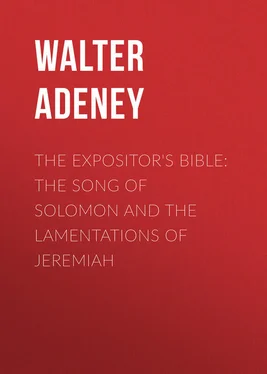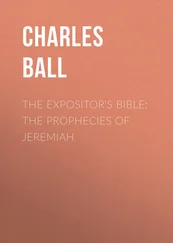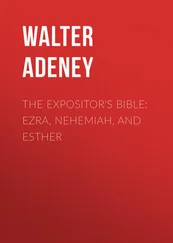Walter Adeney - The Expositor's Bible - The Song of Solomon and the Lamentations of Jeremiah
Здесь есть возможность читать онлайн «Walter Adeney - The Expositor's Bible - The Song of Solomon and the Lamentations of Jeremiah» — ознакомительный отрывок электронной книги совершенно бесплатно, а после прочтения отрывка купить полную версию. В некоторых случаях можно слушать аудио, скачать через торрент в формате fb2 и присутствует краткое содержание. Издательство: Иностранный паблик, Жанр: foreign_religion, foreign_antique, foreign_prose, на английском языке. Описание произведения, (предисловие) а так же отзывы посетителей доступны на портале библиотеки ЛибКат.
- Название:The Expositor's Bible: The Song of Solomon and the Lamentations of Jeremiah
- Автор:
- Издательство:Иностранный паблик
- Жанр:
- Год:неизвестен
- ISBN:нет данных
- Рейтинг книги:3 / 5. Голосов: 1
-
Избранное:Добавить в избранное
- Отзывы:
-
Ваша оценка:
- 60
- 1
- 2
- 3
- 4
- 5
The Expositor's Bible: The Song of Solomon and the Lamentations of Jeremiah: краткое содержание, описание и аннотация
Предлагаем к чтению аннотацию, описание, краткое содержание или предисловие (зависит от того, что написал сам автор книги «The Expositor's Bible: The Song of Solomon and the Lamentations of Jeremiah»). Если вы не нашли необходимую информацию о книге — напишите в комментариях, мы постараемся отыскать её.
The Expositor's Bible: The Song of Solomon and the Lamentations of Jeremiah — читать онлайн ознакомительный отрывок
Ниже представлен текст книги, разбитый по страницам. Система сохранения места последней прочитанной страницы, позволяет с удобством читать онлайн бесплатно книгу «The Expositor's Bible: The Song of Solomon and the Lamentations of Jeremiah», без необходимости каждый раз заново искать на чём Вы остановились. Поставьте закладку, и сможете в любой момент перейти на страницу, на которой закончили чтение.
Интервал:
Закладка:
The bible itself furnishes us with suggestive analogies. Throughout the Old Testament the idea of a marriage union between God and His people occurs repeatedly, and the most frequent metaphor for religious apostasy is drawn from the crime of adultery. 78 78 E.g. Exod. xxxiv. 15, 16; Numb. xv. 39; Psalm lxxiii. 27; Ezek. xvi. 23, etc.
This symbolism is especially prominent in the writings of Jeremiah 79 79 E.g. Jer. iii. 1-11.
and Hosea. 80 80 Hosea ii. 2.; iii. 3.
The forty-fifth psalm is an epithalamium commonly read with a Messianic signification. John the Baptist describes the coming Messiah as the Bridegroom, 81 81 John iii. 29.
and Jesus Christ accepts the title for Himself. 82 82 Mark. ii. 19.
Our Lord illustrates the blessedness of the Kingdom of Heaven in a parable of a wedding feast. 83 83 Matt. xxii. 1-14.
With St. Paul the union of husband and wife is an earthly copy of the union of Christ and his Church. 84 84 Eph. v. 22-33.
The marriage of the Lamb is a prominent feature in the Book of the Revelation. 85 85 Rev. xxi. 9.
Further, it may be maintained that the experience of Christians has demonstrated the aptness of the expression of the deepest spiritual truths in the imagery of the Song of Solomon. Sad hearts disappointed in their earthly hopes have found in the religious reading of this poem as a picture of their relation to their Saviour the satisfaction for which they have hungered, and which the world could never give them. Devout Christians have read in it the very echo of their own emotions. Samuel Rutherford's Letters , for example, are in perfect harmony with the religious interpretation of the Song of Solomon; and these letters stand in the first rank of devotional works. There is certainly some force in the argument that a key which seems to fit the lock so well must have been designed to do so.
On the other hand, the objections to a mystical, religious interpretation are very strong. In the first place, we can quite account for its appearance apart from any justification of it in the original intention of the author. Allegory was in the air at the time when, as far as we know, secondary meanings were first attached to the ideas of the Song of Solomon. They sprang from Alexandria, the home of allegory. Origen, who was the first Christian writer to work out a mystical explanation of this book, treated other books of the Old Testament in exactly the same way; but we never dream of following him in his fantastical interpretations of those works. There is no indication that the poem was understood allegorically or mystically as early as the first century of the Christian era. Philo is the prince of allegorists; but while he explains the narratives of the Pentateuch according to his favourite method, he never applies that method to this very tempting book, and never even mentions the work or makes any reference to its contents. The Song of Solomon is not once mentioned or even alluded to in the slightest way by any writer of the New Testament. Since it is never noticed by Christ or the Apostles, of course we cannot appeal to their authority for reading it mystically; and yet it was undoubtedly known to them as one of the books in the canon of the sacred Scriptures to which they were in the habit of appealing repeatedly. Consider the grave significance of this fact. All secondary interpretations of which we know anything, and, as far as we can tell, all that ever existed, had their origin in post-apostolic times. If we would justify this method by authority it is to the Fathers that we must go, not to Christ and or his apostles, not to the sacred Scriptures. It is a noteworthy fact, too, that the word Eros , the Greek name for the love of man and woman, as distinguished from Agape , which stands for love in the widest sense of the word, is first applied to our Lord by Ignatius. Here we have the faint beginning of the stream of erotic religious fancies which sometimes manifests itself most objectionably in subsequent Church history. There is not a trace of it in the New Testament.
If the choice spiritual ideas which some people think they see in the Song of Solomon are not imported by the reader, but form part of the genuine contents of the book, how comes it that this fact was not recognised by one of the inspired writers of the New Testament? or, if privately recognised, that it was never utilised? In the hands of the mystical interpreter this work is about the most valuable part of the Old Testament. He finds it to be an inexhaustible mine of the most precious treasures. Why, then, was such a remunerative lode never worked by the first authorities in Christian teaching? It may be replied that we cannon prove much from a bare negative. The apostles may have had their own perfectly sufficient reasons for leaving to the Church of later ages the discovery of this valuable spiritual store. Possibly the converts of their day were not ripe for the comprehension of the mysteries here expounded. Be that as it may, clearly the onus probandi rests with those people of a later age who introduce a method of interpretation for which no sanction can be found in Scripture.
Now the analogies that have been referred to are not sufficient to establish any proof. In the case of the other poems mentioned above there are distinct indications of symbolical intentions. Thus in the Gitagovinda the hero is a divinity whose incarnations are acknowledged in Hindoo mythology; and the concluding verse of that poem points the moral by a direct assertion of the religious meaning of the whole composition. This is not the case with the Song of Solomon. We must not be misled by the chapter-headings in our English Bibles, which of course are not to be found in the original Hebrew text. From the first line to the last there is not the slightest hint in the poem itself that it was intended to be read in any mystical sense. This is contrary to the analogy of all allegories. The parable may be difficult to interpret, but at all events it must suggest that it is a parable; otherwise it defeats its own object. If the writer never drops any hint that he has wrapped up spiritual ideas in the sensuous imagery of his poetry, what right has he to expect that anybody will find them there, so long as his poem admits of a perfectly adequate explanation in a literal sense? We need not be so dense as to require the allegorist to say to us in so many words: "This is a parable." But we may justly expect him to furnish us with some hint that his utterance is of such a character. Æsop's fables carry their lessons on the surface of them, so that we can often anticipate the concluding morals that are attached to them. When Tennyson announced that the Idyls of the King constituted an allegory most people were taken by surprise; and yet the analogy of The Faerie Queen , and the lofty ethical ideas with which the poems are inspired, might have prepared us for the revelation. But we have no similar indications in the case of the Song of Solomon. If somebody were to propound a new theory of The Vicar of Wakefield , which should turn that exquisite tale into a parable of the Fall, it would not be enough for him to exercise his ingenuity in pointing out resemblances between the eighteenth-century romance and the ancient narrative of the serpent's doings in the Garden of Eden. Since he could not shew that Goldsmith had the slightest intention of teaching anything of the kind, his exploit could be regarded as nothing but a piece of literary trifling.
The Biblical analogies already cited, in which the marriage relation between God or Christ and the Church or the soul are referred to, will not bear the strain that is put upon them when they are brought forward in order to justify a mystical interpretation of the Song of Solomon. At best they simply account for the emergence of this view of the book at a later time, or indicate that such a notion might be maintained if there were good reasons for adopting it. They cannot prove that in the present case it should be adopted. Moreover, they differ from it on two important points. First , in harmony with all genuine allegories and metaphors, they carry their own evidence of a symbolical meaning, which as we have seen the Song of Solomon fails to do. Second , they are not elaborate compositions of a dramatic or idyllic character in which the passion of love is vividly illustrated. Regarded in its entirety, the Song of Solomon is quite without parallel in Scripture. It may be replied that we cannot disprove the allegorical intention of the book. But this is not the question. That intention requires to be proved; and until it is proved, or at least until some very good reasons are urged for adopting it, no statement of bare possibilities counts for anything.
Читать дальшеИнтервал:
Закладка:
Похожие книги на «The Expositor's Bible: The Song of Solomon and the Lamentations of Jeremiah»
Представляем Вашему вниманию похожие книги на «The Expositor's Bible: The Song of Solomon and the Lamentations of Jeremiah» списком для выбора. Мы отобрали схожую по названию и смыслу литературу в надежде предоставить читателям больше вариантов отыскать новые, интересные, ещё непрочитанные произведения.
Обсуждение, отзывы о книге «The Expositor's Bible: The Song of Solomon and the Lamentations of Jeremiah» и просто собственные мнения читателей. Оставьте ваши комментарии, напишите, что Вы думаете о произведении, его смысле или главных героях. Укажите что конкретно понравилось, а что нет, и почему Вы так считаете.












